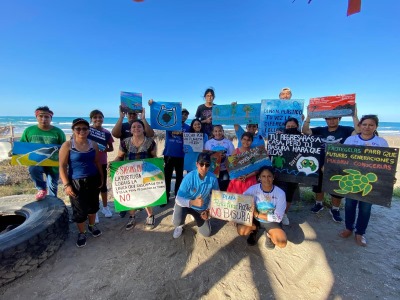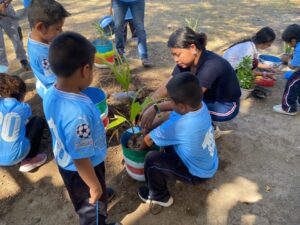In the framework of World Environmental Education Day, which is celebrated on 26 January, GPG Mexico’s environmental initiatives have reinforced their commitment to the development of strategies that promote climate action in the communities in which they are present. As part of our Environmental and Social Policy, the Tuxpan III and IV combined-cycle power stations, as well as the Bií Hioxo wind farm, have carried out various actions during 2023 and plan additional programmes for 2024.
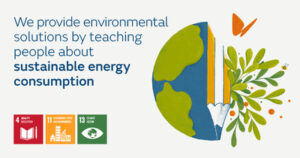
Read about the programmes that took place in 2023:
At the Tuxpan III and IV combined-cycle power stations:
- The Villamar Sea Turtle Camp “Nakú Kayám” held several environmental workshops focused on the conservation of three species: Lepidochelys kempii, Cheloni mydas and Eretmochelys imbricata. These are classified as endangered species and therefore are subject to protection category. In addition, clean-up actions were carried out on the beaches.
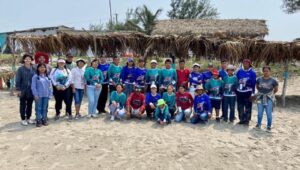
- The “Xalag Chúchut” water school, which aims to foster reflection on the importance of having eco-technologies that enable the conservation, collection and treatment of water for integrated community management.
At Bií Hioxo wind farm:
- Reforestation programmes in two schools that are close to the installation, Technical High School #103, Elementary School “05 de Septiembre” and Elementary School “Cristóbal Colon” in Playa Vicente, as well as in the CRI Santa Martha Sports Centre and the North substation of the park. A total of 50 plants endemic to the region were planted, mostly for shade, fruit trees and planters.

Image during a reforestation campaign at schools. - Cleaning of community spaces, including the Santa Martha CRI Sports Centre and the main streets of Séptima Sección, correctly separating waste and collecting PET plastic in conjunction with the “Guixhi Naa’ Ya” (“green rubbish”) collective, which collects this waste to give it a second use.
Community bazaars where items can be exchanged for plants and PET plastic, which were used to carry out the aforementioned reforestations.
In line with this vision, by 2024, environmental education programmes have been developed with the aim of empowering the skills and capacities of the communities in which GPG Mexico operates.
Read about the programmes that will be carried out in 2024:
For the combined-cycle power stations Tuxpan III and IV:
- Training of skilled change agents to contribute to the design and implementation of sustainable solutions for the communities along the Ruta de los Kilómetros. These environmental educators will provide knowledge and tools through practical activities.
- Construction and operation of an educational plant nursery, where young people will germinate local species of a cultural, economic and environmental value.
- School allotments, where students will learn about production and harvesting cycles, generating food for self-consumption and local sale.
- Committees in charge of operating the rainwater harvesting systems that have already been installed, as well as the eight systems that will be installed in the schools along the route.
- Municipal solid waste management, to promote a circular economy culture among young people in the area.
Goal: Direct impact on the two Telebachilleratos and indirectly on approximately 10,000 inhabitants of the Ruta de los Kilómetros.
At Bií Hioxo wind farm:
- Fitting out of the allotment and nursery in the Bií Hioxo wind farm, for the production of vegetables and plants endemic to the Isthmus region, which will be used for shade, fruit and medicinal plants.
- Creation of compost and vermicompost at the Nacanu’ Bíi Community House, to be replicated in secondary schools in the vicinity of the project, neighbours of Séptima Sección and family members of owners.
- Ten reforestation programmes with 500 plants endemic to the region, which at the end of the year are expected to be covered with plants produced in the plant nursery.
- Clean-up days at the Laguna Superior in Playa Vicente, the Río de los perros and community spaces in Juchitán.
- Workshops to raise awareness of the separation of solid urban waste in schools, substations (north and south) and administrative offices, which will also be used to continue with the community gardens.
- Training of Xquendas (volunteers) to be environmental educators in their schools/colonies.
- Workshops on the importance of wind energy and guided tours of the Bií Hioxo wind farm.
Goal: Direct impact on three secondary schools, 20 people from the community, five Xquendas and indirectly on more than 5,000 people located in Juchitán and Playa Vicente.
For the Durango combined cycle power plant:
At the Durango combined-cycle plant in Mexico, a collaboration agreement has been reached to provide specialised training to the local environmental police force. The main aim is to provide officers with the necessary skills to understand and recognise the different elements that comprise the administrative procedure, as well as the regulations that govern this process at the local level.
This training programme will cover the essentials for conducting natural resource surveillance and inspection actions. Furthermore, participants will be instructed on the identification of security and control measures that can be implemented in this context.
To learn more about the details of this agreement, we invite you not to miss the interview with David Adrián Najera, Chemical Service and Environmental Control at CCC Durango.
- How did the possibility of collaborating in this field with the municipality of Durango come about? We have had a very good relationship with the municipality for several years now, which has allowed us to work together with the Municipal Environment department to carry out reforestation projects, among other things, as well as the construction of a park for people to walk their pets, called Parque Perrón (‘Big Dog Park’).
- What is the aim of this collaboration? The main aim is the specialisation of the environmental police force, who are there to serve the community in terms of environment-related matters, animal cruelty, etc., which both benefits the surrounding communities and provides legal training for the plant’s collaborators.
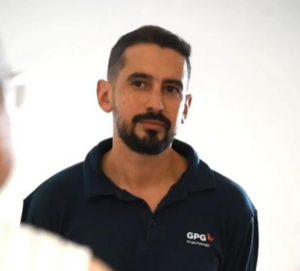
- Who are all the parties involved in this collaboration? Who will directly benefit from it? This collaboration will benefit the communities surrounding the plant, specifically the villages of Carlos Real, Abraham González and 27 de Noviembre, as the municipality will hold environmental lectures to teach the community about recycling, and will implement the “Dando y Dando” (Giving and Giving) programme, where the residents will give their recyclable waste to the municipality, and in return the municipality will provide these people with staple foodstuffs. In addition, the plant’s employees will benefit from courses on “Waste Management” (solid urban waste, special handling of waste and hazardous waste), a course on “Efficient Water Use”, and training in the growing of species for reforestation in greenhouses.
- What plan has been devised for these actions?
- An agreement signing event is planned with the mayor of Durango, Antonio Ochoa, and the head of the power station, Pablo Leyva.
- The environmental police training course will be held on 8 and 9 February.
- No date has yet been set for the other activities mentioned.
In conclusion, the signing of this momentous agreement between Durango CCP and the environmental police force marks a significant milestone in promoting environmental education and improving administrative skills. This step forward will strengthen the ability of our officers to safeguard our natural resources and implement effective security and control measures.


